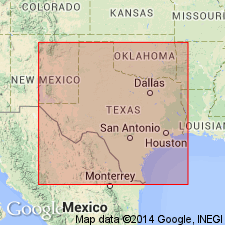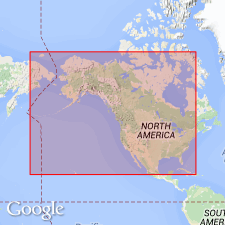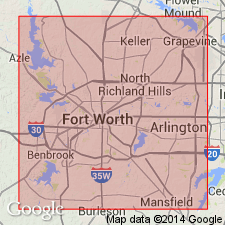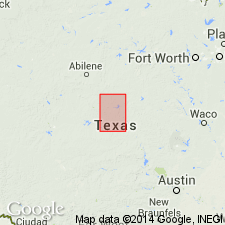
- Usage in publication:
-
- Indian Creek bed
- Modifications:
-
- Original reference
- Dominant lithology:
-
- Clay
- Shale
- Coal
- AAPG geologic province:
-
- Bend arch
Summary:
Pg. 374, 386. Indian Creek bed in Strawn division. Shaly sandy clay, thickness not stated. Member of Strawn division [Strawn is 2nd from base of 5 Carboniferous divisions of Cummins, 1891]. Overlies Antelope Creek bed or, where that is absent, Comanche Creek bed. Underlies Ricker bed. Age is Pennsylvanian.
[Named from Indian Creek, Brown Co., Colorado River region, central TX.]
[See also GNC remark (Wilmarth, 1938, US geologic names lexicon, USGS Bull. 896).]
Source: US geologic names lexicon (USGS Bull. 896, p. 1009).

- Usage in publication:
-
- Indian Creek
- Modifications:
-
- Overview
- AAPG geologic province:
-
- Bend arch
Summary:
N.F. Drake applied Indian Creek to 2 units, one in Admiral formation (Permian), and the other in Strawn formation (Pennsylvanian). E.H. Sellards (Univ. Texas Bull. 3232, p. 105, 170, 173, 1933) retained the name for the Pennsylvanian unit and discarded it for the Permian unit, although the Permian name has had greater usage.
Source: US geologic names lexicon (USGS Bull. 896, p. 1009).

- Usage in publication:
-
- Indian Creek bed
- Modifications:
-
- Areal extent
- AAPG geologic province:
-
- Fort Worth syncline
Summary:
Pg. 74. Indian Creek bed in Strawn series. Shaly sandy clay. Overlies Antelope Creek bed or, where that is absent, Comanche Creek bed; underlies Ricker bed. [Age is Pennsylvanian; age of Strawn not discussed.]
[Report area in Parker County, central Texas.]
Source: US geologic names lexicon (USGS Bull. 1200, p. 1862-1863); supplemental information from GNU records (USGS DDS-6; Denver GNULEX).

- Usage in publication:
-
- Indian Creek bed
- Modifications:
-
- Not used
- AAPG geologic province:
-
- Bend arch
Summary:
Pg. 58, pl. 27. [†Indian Creek bed of Strawn formation not used by the USGS; a local term considered obsolete. See also entry under Strawn.] Drake (1893) separated rocks of Strawn group [division] into 20 units of alternating sandstone and shale beds. He gave local names to these units, or "beds" as he termed them, and numbered them from bottom to top, 4 to 23. Only Drake's name for upper unit, the Ricker, is in common use today, and that name has been restricted to base of Drake's Ricker bed.
Source: US geologic names lexicon (USGS Bull. 1200, p. 1862-1863).
For more information, please contact Nancy Stamm, Geologic Names Committee Secretary.
Asterisk (*) indicates published by U.S. Geological Survey authors.
"No current usage" (†) implies that a name has been abandoned or has fallen into disuse. Former usage and, if known, replacement name given in parentheses ( ).
Slash (/) indicates name conflicts with nomenclatural guidelines (CSN, 1933; ACSN, 1961, 1970; NACSN, 1983, 2005, 2021). May be explained within brackets ([ ]).

